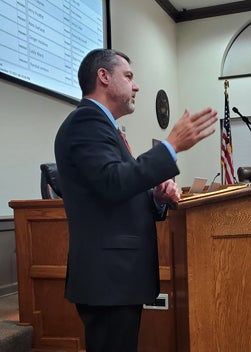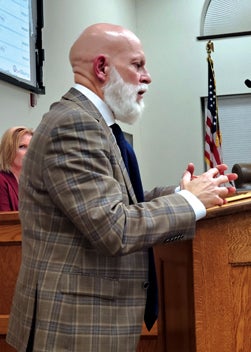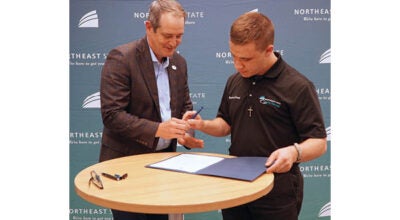Commission takes a stand in fight against opioid addiction
Published 10:18 pm Tuesday, November 16, 2021
|
Getting your Trinity Audio player ready...
|
BY IVAN SANDERS
STAR STAFF
ivan.sanders@elizabethton.com
The Carter County Commission voted Monday to hold $1.8 million in pharmaceutical suit settlement funds in reserve to support local judges and prosecutors in their vision for a medically-based drug and alcohol treatment center.
In a 21-0 vote, the commission agreed to place the funds received from the Baby Doe drug settlement in reserve to give time for Criminal Court Judge Stacy Street, Judge Lisa Rice, Judge Jim Goodwin, District Attorney General Barry Staubus, other district attorneys, and the Families Free organization to put together a plan to help change those with addictions into productive members of the community by helping them break their addiction completely.
“We are not asking you to vote tonight, we are only asking you to consider something,” Street said. “Last year, as in every year, Judge Rice and I in these four counties (Washington, Carter, Unicoi, and Johnson) closed out between 4,000 to 6,000 charges against offenders. Judge Goodwin does a comparable amount in Sullivan County. The reason that I am telling you that is important is that about 75 to 80 percent of those cases possibly more involve some type of drugs.
“The easy ones are the sale of methamphetamines, marijuana, and things like that. The ones that you don’t always see are the homicides, domestic violence, burglaries, and robberies. They all have some tie-in to drugs. You have to ask yourself, the population of Carter County is about 50,000 give or take a little bit and it’s been that way the last 70 years. You ever figured out why the jail population has almost tripled during that time period? How much it has doubled in the last 20 years? People are committing more crimes, but the issue is drugs.”
The Baby Doe lawsuit was filed in June 2017 on behalf of Baby Doe, a child born addicted to opioids, and a group of local governments in Northeast Tennessee. The group wanted to prove that Endo, the drugmakers Purdue Pharma and Mallinckrodt, and several opioid distributors knew they were fueling Northeast Tennessee’s drug addiction epidemic by pumping vast quantities of opioids into the region. The local government plaintiffs in the case alone had sought $2.4 billion in damages through the case to fund recovery programs for the Northeast Tennesseans who have suffered most from the crisis.
The $1.8 million in funds is Carter County’s portion of the settlement.
“We have talked to everyone from Morristown to Johnson County,” Street said. “There are four reasons that you see someone commit a crime. The first is they are in the wrong place at the wrong time; you have people that have mental illnesses that their thinking is so impaired they don’t know what they are doing and can’t make a rational decision; someone has an addiction to drugs, alcohol, sex or something like that; and fourth some are just d**n mean.
“Those jail cells over there and in penitentiaries should be reserved for those people who are just d**n mean. The problem you have is those people that fall in category number two and category number three can’t control the problem on their own. They keep committing crimes to feed their addiction. And we keep seeing it over and over again. What we want to propose to you is with this opioid settlement that we use that money to help those people in category 2 and category 3 from the Baby Doe case.”
According to Street, the plan is to attempt to secure the now-vacant Carter County Annex in Roan Mountain and turn the facility into a place where addicts can receive help modeled along the lines of Recovery Court. The concept, which was first introduced by Rice to help those that qualify get help with their addictions and to help them understand finance, get their GEDs, and even obtain a driver’s license, has proven quite successful in keeping these individuals from filling jail cells.
Street told the commission that if the program works out the way it is envisioned, it could be a model for the entire state.
“I am going to end with this — this is your money,” Street said. “You can spend it any way you want. You can buy a school bus, a water line, or whatever you want. But what we are asking is that you hold out and let us see if we can come up with something to make a difference right here. That child was born addicted to opioids and these doctors hand out these drugs like Tic Tacs and M&M’s.
“Here is an example that a commissioner in Washington County used — if you have a water leak in your house and get that big insurance check and you replace the carpet, the sheetrock, and a new big-screen television, and you don’t fix the leak you still have a leak.”
The judges are asking each municipality and county government that would participate to hold the settlement money, which should total $21 million.
The commission gave those who came to present a standing ovation before passing a resolution to place the $1.8 million in reserve as well as sending a letter of support to area legislators to request help in securing the Annex for the project.
Carter County Mayor Patty Woodby said she was proud of the commission for being one of the first to make such a commitment.
“Carter County is now leading the region in exploring innovative and collaborative ways to deal with really tough problems that impact peoples lives and families,” Woodby said. “Right now we have an unused facility that can be put to good use helping people get a fresh start in their lives.
“By pairing addiction recovery with vocational skills so they can get back on track with the dignity of a job to support themselves and their families. We cannot continue to build jails and incarcerate those individuals who do not need incarceration but need treatment for addiction and mental illness. want to say thank you to the commission for recognizing this need in our community and allowing the opportunity to make this a reality. We are changing the conversation about Carter County.”






